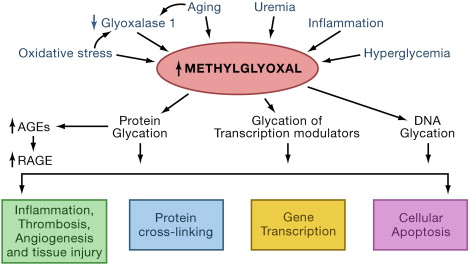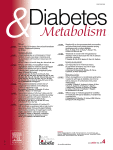This isn't exactly the case. While fructose creates marginally more advanced glycation end products than glucose, the amount of free fructose that is in serum to create those end products is minimal. What this means is that in the body fructose doesn't create more advanced glycation end products than glucose does, overall. I'm pretty sure the main component indicated in the formation of advanced glycation end products is Methylglyoxal. Methylglyoxal seems to be created largely via ketosis, and via the excess glycolysis seen in diabetes.but fructose causes advanced glycation end products more than glucose.

Methylglyoxal Comes of AGE
The posttranslational modification of proteins by methylglyoxal, a highly reactive compound derived from glycolysis, may contribute to aging, diabetes, and other disorders. In this issue of Cell, Brownlee and colleagues (Yao et al., 2006) demonstrate a specific mechanism by which methylglyoxal...
www.cell.com

Ketosis Leads to Increased Methylglyoxal Production on the Atkins Diet | Request PDF
Request PDF | Ketosis Leads to Increased Methylglyoxal Production on the Atkins Diet | In the popular and widely used Atkins diet, the body burns fat as its main fuel. This process produces ketosis and hence increased levels of... | Find, read and cite all the research you need on ResearchGate

Elevated level of methylglyoxal during diabetic ketoacidosis and its recovery phase
Carbonyl stress is hypothesized to be an associated complication of diabetic ketoacidosis. The production of the glycolytic intermediate methylglyoxal…
I haven't found a single study to show the ingestion of fruits creating endotoxemia. If anything most studies show that fruits are protective from endotoxemia. Chlorophyll's protective mechanisms in the GI tract seem to be centered more around protecting against Heme Iron than endotoxin from what I can tell. The polyphenols in leaves, and in fruits are protective against dysbiosis and endotoxemia.what about chlorophyll as a fighting agent against endotoxins? is it true that our cousin primates fought endotoxins from fruits with eating grass and leaves?
I had a desire to occasionally taste some leaves when I was a child.
Also, different primates eat different diets. Bonobos and chimps eat more ripe fruit based diets. Gorillas and orangoutangs can eat more fibrous plant matter like pith, twigs, bark, grasses, etc. Lower monkeys have a mix depending on the species.
